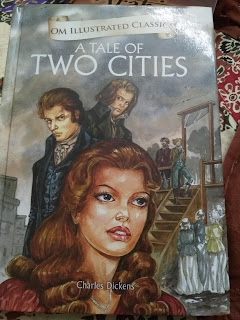Unrelated though, wanted to refresh these - also included with Matilda by Roald Dahl and Wizard of Oz by L.Frank Baum, but the latter two was already reviewed. Together I would say 76 to 78 of 2020. How illogical it may seem that I mention two unrelated books together - but so is life; never know what , why or who two come together - when and how?
Per Wiki "Tenāli Rāmakr̥ṣṇuḍu was an Indian poet, scholar, thinker and a special advisor in the court of Sri Krishnadevaraya who ruled from C.E. 1509 to 1529. He was a Telugu poet who hailed from what is now the Andhra Pradesh region, generally known for the folk tales which focus on his wit."
Many years ago, when the kingdom of Vijayanagar was ruled by Krishnadeva Raya, a youth named Rama lived in Tenali Village. He was given a mantra by a holy man who brought rain to the drought effected village. Ram doubted him but had good memory so remembered the mantra that would evoke Goddess Kali, and he was successful in doing that. When Goddess appeared before him, he had a hearty laugh, instead of being scared or surprised. On asking why, he said I have trouble in managing one nose with two hands, how do you manage with your many noses and just two hand? Goddess blessed him with the gift of making people laugh and said he would be remembered as Vikatakavi or a jesting poet.
She granted him another boon, and asked him to choose between golden cup in right hand with milk of learning and silver cup in left hand with curds of wealth. He said he would need to taste before choosing, asked her to give both, mixed them and in a flash drank both. Then humbly said what is the use of mere learning to me without the comfort of wealth? His wit and prosperity helped him gain many friends and enemies. He became the court jester & then on interIntere stories in court.
-----------------------------------------------------------------------------------
A Tale of Two Cities by Charles Dickens
1775. King George 111 of England busy dealing with the nascent English colonies in America and King Louis XVI of France lost in pleasure of wealth and living in perpetual merriment. Both monarch completely oblivious of the state of their countries heading towards a revolution.
"It was the best of times, it was the worst of times, it was the age of wisdom, it was the age of foolishness, it was the epoch of belief, it was the epoch of incredulity, it was the season of Light, it was the season of Darkness, it was the spring of hope, it was the winter of despair, we had everything before us, we had nothing before us, we were all going direct to Heaven, we were all going direct the other way—in short, the period was so far like the present period, that some of its noisiest authorities insisted on its being received, for good or for evil, in the superlative degree of comparison only"
"For your happiness I have no qualms about giving up my own.
"A wonderful fact to reflect upon, that every human creature is constituted to be that profound secret and mystery to every other."
& The ever green:
“It is a far, far better thing that I do, than I have ever done; it is a far, far better rest that I go to than I have ever known.”
An extraordinary saga of love, betrayal, loyalty and human struggle, this is a tale that keep attracting me.


No comments:
Post a Comment